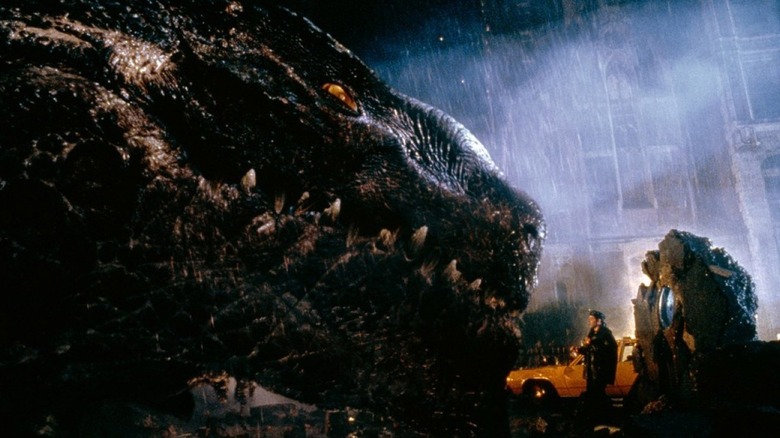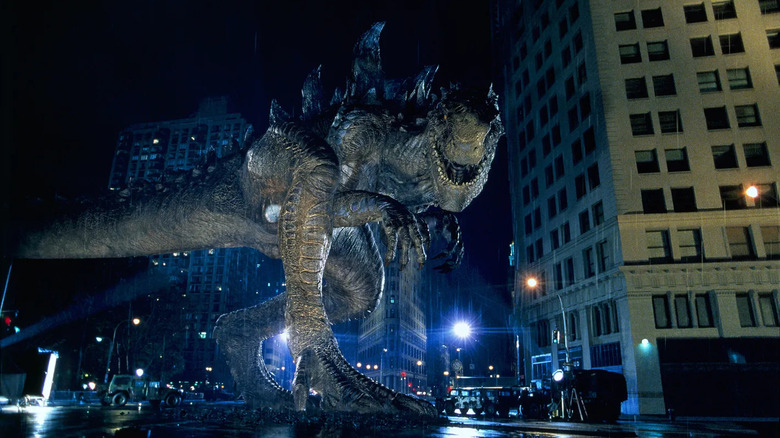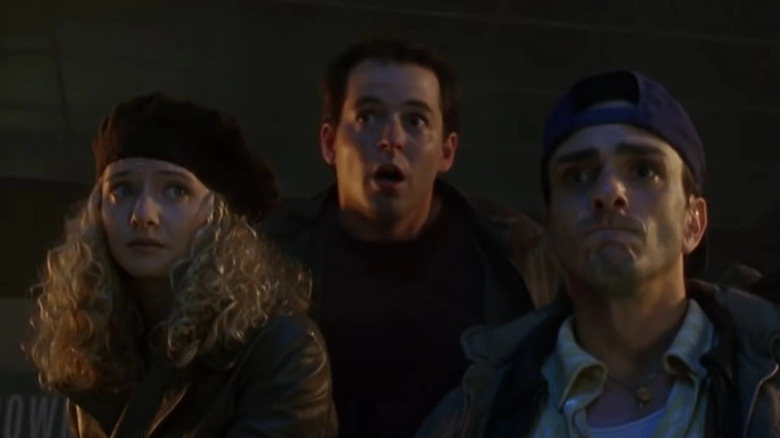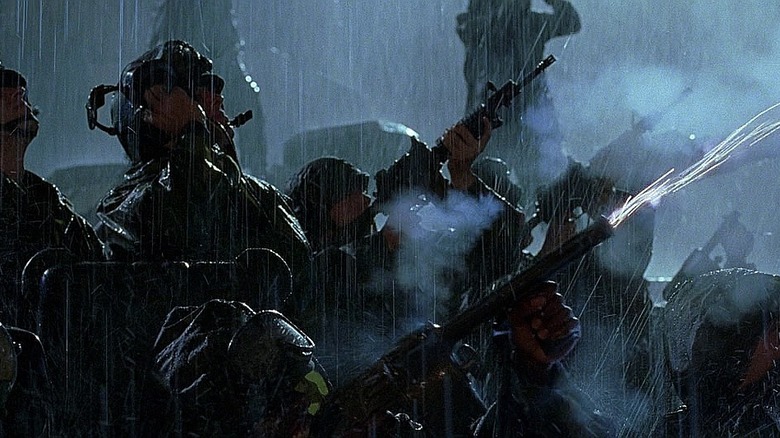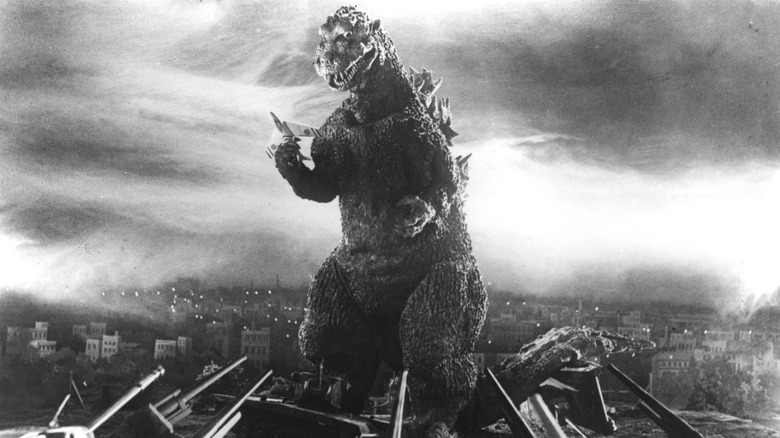Rage Against The Machine's Song For The 1998 Godzilla Soundtrack Actually Criticized Blockbuster Movies
In today's age of streaming services and TikTok trends, there really isn't a place for the movie tie-in soundtrack album anymore. While record companies have essentially allowed social media to take over the legwork of promoting their new artists as well as rediscover classic ones, executives in the '80s and '90s found that producing "Music From and Inspired By" albums for major motion pictures could act as an additional revenue stream as well as backdoor marketing for the acts on their labels.
As such, not too much attention was paid to the actual content or tone of the songs with regard to the films they were supposed to be "from" — for instance, the soundtrack for 1996's "Mission: Impossible" features a track by Britpop band Pulp entitled "I Spy," which is a lengthy diss track against affluent Londoners. But hey, it has "spy" in the title, and "Mission: Impossible" is about spies!
However, by far the most incongruous movie soundtrack contribution (at first glance, anyway) is the song "No Shelter" by Rage Against the Machine, as recorded for 1998's "Godzilla: The Album." Where lots of tracks were submitted to soundtrack albums without much consideration for their content, Rage used the opportunity to commit a clever act of subversion against the Hollywood marketing machine, writing an original song that not only slammed "Godzilla" itself, but blockbuster movies in general.
Hype does matter
By the late '90s, the movie soundtrack album had become more than just a staple of marketing a film — it was practically a requirement. Sure, not every movie that was released had a soundtrack album to go with it, but the format had become so prevalent that record producers were becoming increasingly ambitious with each album. Bigger and bigger acts were not only signed but commissioned to record original songs, albums like the "Judgement Night" and "Spawn" soundtracks saw experimentation with cross-promoting disparate bands and genres, and indie rom-coms like "She's the One" were getting original full albums from the likes of Tom Petty and the Heartbreakers.
The entire marketing strategy for 1998's "Godzilla" was built around the tagline "Size Does Matter," and it refers not just to the titular gigantic kaiju but to the expectations and aims of the movie itself. "Godzilla" was not only the first Hollywood adaptation of Toho Studios' popular character, it was director Roland Emmerich's follow-up to his massive summer hit "Independence Day" from 1996.
As such, Epic Records (a division of Sony, as was Tristar Pictures, which produced the film) decided to go all out for "Godzilla: The Album." Bands as popular and diverse as Foo Fighters, Fuel, Ben Folds Five, Jamiroquai, and The Wallflowers were asked to be involved, and the signature cut from the album was "Come With Me," an audacious contribution by Sean Combs (under the name Puff Daddy) which was essentially a cover version of Led Zeppelin's "Kashmir."
Upon the movie's release, there was so much hype and noise surrounding "Godzilla," its reception, its quality (or lack thereof), and Puff Daddy's MTV-boosted hit that it was easy for Rage Against the Machine to slip a genuine protest song through the cracks, and slip it they did.
'Pure motherf****** filler'
Certainly the executives behind "Godzilla: The Album" were aware of Rage Against the Machine's reputation when they hired the band to contribute to the "Godzilla" soundtrack. Forming in the early '90s, Rage Against the Machine signed with Epic Records in 1992 and quickly gained notoriety as envelope pushers. For instance, their single "Killing in the Name" contains 17 appearances of the word "f***" and was banned on the radio during a time of heavy censorship in the mainstream media.
Because Epic was no doubt expecting (and likely even hoping for) some profanity on "No Shelter," they may not have listened to the final track too closely, in which vocalist Zach de la Rocha spits out a lyric that bashes the movie the song is ostensibly promoting: "Godzilla, pure motherf***** filler/To keep your eyes off the real killer."
Of course, that's a relatively small moment in a larger song, but as I pointed out in my Twitter thread about the track, the rest of the lyrics comprise a scathing critique of Hollywood. Rage even find room to call out the likes of Steven Spielberg, whose 1997 film "Amistad" told the tale of the slave trade of Black people in the 1830s, a movie which "No Shelter" decries: "the truth was feathered and tarred/Memories erased, burned, and scarred."
"No Shelter" is undeniably a protest song, with the track's thesis summed up in the refrain "Cinema, simulated life, ill drama/Fourth Reich culture, Americana/Chained to the dream they got you searchin' for/The thin line between entertainment and war." It's surprising that the corporate arms of Sony allowed such a message to be stated on their marketing materials back then — it's even more unfathomable now, as corporate interests in mass media have only become more powerful and controlling.
The music video for 'No Shelter' is still banned from YouTube
Along with their incendiary music, Rage Against the Machine made sure to pack their music videos full of pointed messages as opposed to using generic imagery. Even though "No Shelter" was a tie-in with "Godzilla," the music video for the song did not break that tradition: the video depicts an Industrial Revolution meets "1984" environment where company executives in suits oversee workers in assembly lines dressed in drab greys.
The clip gets darker as it goes along, depicting an allegory for the placating nature of mainstream cinema: the execs test out some sort of virtual reality helmet on a teenager which eventually depicts a smiling face over his real face. Declaring the helmet a success, the executives take the teenager away to a remote location and kill him. Along the way, references to Mumia Abu-Jamal (a political activist sentenced to death in 1982 for the murder of police officer Daniel Faulkner), Hiroshima, poverty, and imperialism can be seen on billboards in and around the factory with slogans that mock the "Size Does Matter" tagline from "Godzilla."
However, only some of this footage can be found on YouTube. The full video has been banned from the site for years thanks to the song's references to brands like Coca-Cola and Nike, meaning that the corporate interests that somehow didn't stop the song and video from being originally released have finally caught up with it. However, this being the internet, there may still be a way to watch the full video if you know where to look.
'Godzilla' is political? Always has been
At first glance, it seems that Rage hijacked the "Godzilla" soundtrack to make their own heavily critical and politicized statements. After all, the film, which blatantly rips off the "Jurassic Park" movies and includes characters who are thinly-veiled facsimiles of critics Roger Ebert and Gene Siskel in order to preemptively mock them, is hardly operating on the same subtextual or intellectual level as Rage.
Yet it's important to remember that the original "Godzilla" from 1954 was just as politically bold and savvy as "No Shelter." The Japanese film wasn't just obliquely referencing the devastation visited on Nagasaki and Hiroshima during World War II, but was also inspired by the continued proliferation of nuclear weapons: the Lucky Dragon No. 5 tragedy was fresh in the mind of director Ishirō Honda when making "Godzilla," and much of the movie is divided between the titular kaiju's attacks and a scientist's struggle with utilizing a new weapon against Godzilla, lest it launch a deadlier arms race.
With 1998's "Godzilla" being an ostensible remake of Honda's original, even Emmerich (who tried to get out of directing in the first place) couldn't completely divorce the material from its political roots, ultimately paying lip service to themes of nuclear fallout being responsible for birthing Godzilla and humanity's bureaucratic hubris only making matters worse.
As such, one might say that Rage Against the Machine weren't ignoring their "Godzilla" assignment, but making up for the aspects Emmerich's film lacked. "Godzilla" 1954 was very much about "the thin line between entertainment and war," and while the blockbuster films of the late '90s were already pointing toward a future where that line would become further obfuscated, Rage did their best to make sure the public still knew about it. Knowledge, after all, Does Matter.
